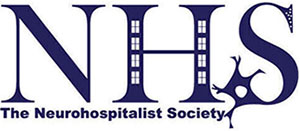Accreditation will depend upon the program demonstrating institutional infrastructure capable of supporting the fellowship, in addition to providing a curriculum that meets key training requirements for neurohospitalist practice.
Sponsoring Institution
- Neurohospitalist fellowships must be overseen by a Sponsoring Institution that maintains institutional accreditation with the Accreditation Council for Graduate Medical Education (ACGME)1 or the Canadian Excellence in Residency Accreditation (CanERA).2 Programs seeking accreditation must provide a letter, signed by the Designated Institutional Official or representative, stating the Sponsoring Institution’s ACGME or CanERA accreditation is current, and that the Graduate Medical Education Committee (GMEC) or Postgraduate Education Committee has knowledge of the Neurohospitalist fellowship and has approved its application for accreditation as relevant to the Sponsoring Institution.
- If the Sponsoring Institution or any Participating Site loses its accreditation to provide patient care, the program must notify Neurohospitalist Society in writing within 30 days. The program must also provide a written plan for how current fellows will complete their training, as well as a written plan for fellows for whom there is a mutual agreement to attend the program in the future.
- In the event of fellowship closure, the fellowship or Sponsoring Institution must notify NHS of the intent to close in writing as soon as possible. The Sponsoring Institution must allow fellows whose fellowship has already started to complete their fellowship at the Sponsoring Institution or assist them in finding and enrolling in an alternative training program.
- The Sponsoring Institution must provide fellows with professional liability insurance for the duration of their appointment. The insurance policy must be occurrence based or provide extended reporting endorsement coverage.
- The Sponsoring Institution must have a Department that takes primary responsibility for the Neurohospitalist Fellowship. The Fellowship Director must be a member of this Department. The Department Chair must provide a letter stating their support of the Neurohospitalist Fellowship program, stating their support of the Fellowship Director, and listing the resources provided to administer the program (including but not limited to %Full Time Equivalent (FTE) support for the Fellowship Director, %FTE support for the Fellowship Coordinator, and source of funding for the Fellowship position). If no %FTE is provided for one or more of these positions, this must be stated.
Participating Sites
- Neurohospitalist fellowships may take place at any hospital affiliated with the Sponsoring Institution. Each Participating Site must provide documentation of an affiliation agreement with the Sponsoring Institution that grants the Participating Site authority to provide an educational experience for trainees under the oversight of the Sponsoring Institution.
- Each Participating Site must provide a letter signed by the Chair of the Department or the Medical Director of the service where the clinical experience will take place that:
- describes the specific clinical experience that will take place,
- specifies its duration,
- and states that the Participating Site is capable of providing the desired clinical training experience and the necessary level of supervision.
Endnotes
1Institutional ACGME accreditation guarantees the following oversight structures and resources are in place, in addition to or as specified in more detail above:
- Written statement of commitment to graduate medical education (GME) by the Sponsoring Institution.
- Sponsoring Institution either has or is affiliated with sites that have accreditation to provide patient care.
- Graduate medical education committee (GMEC).
- Resident/fellow forum for ACGME-accredited residencies and fellowships.
- Faculty development regarding unprofessional behavior, burnout, depression, substance abuse.
- Policy regarding physician impairment.
- Policy regarding sexual and other forms of harassment and system for reporting and resolving complaints.
- Policy for learners with disabilities.
- Policy for interaction with vendors and corporations.
- Confidential, affordable, and timely mental health care for faculty and trainees.
- Healthy and safe work and educational environment.
- System that allows fellows to raise concerns and grievances, including those of inadequate supervision and professionalism, confidentially, where appropriate, and without concern for retaliation.
- Access to medical literature.
- Patient care support systems including intravenous access placement, phlebotomy, patient transportation, laboratory, pathology, and radiology services.
- Learning environment that allows fellows to participate in patient safety and quality improvement intitiatives, and provides professional development on transitions of care.
2Institutional CanERA accreditation guarantees the following oversight structures and resources are in place, in addition to or as specified above:
- A mission statement identifying the faculty of medicine’s overarching purpose in residency education and other parts of the continuum of medical education.
- Postgraduate education dean and postgraduate education committee.
- Effective policies and processes to govern postgraduate education.
- Process to report concerns regarding supervision.
- Policy regarding residents’ physical, psychological, and professional safety.
- Confidential resident wellness support is in place and accessible, and an effective process for reporting and addressing instances of mistreatment is in place.
- Effective process for assessment of teachers involved in residency education, and a dedicated, accessible faculty development program.
- Systematic process to review and improve the learning environment at each learning site.
Timeline
| Initial Application Deadline |
Accreditation Notification |
Annual Status Report Deadline |
Biennial Program Evaluation Report Deadline |
| Sept 1, 2022 / March 1, 2023 |
Dec 1, 2022 / July 1, 2023 |
May 1, 2024 | May 1 (every 2 years); first will be May 1, 2025 |
| May 1, 2024 | Jul 1, 2024 | May 1, 2025 | May 1, 2026 |
| May 1, 2025 | Jul 1, 2025 | May 1, 2026 | May 1, 2027 |
| May 1, 2026 | Jul 1, 2026 | May 1, 2027 | May 1, 2028 |
